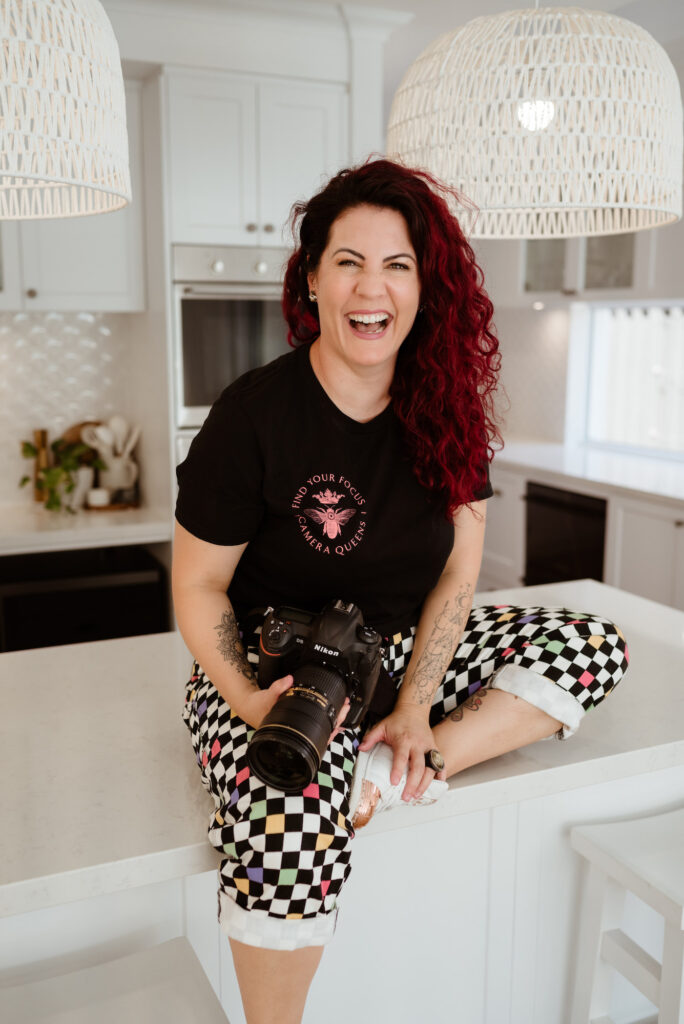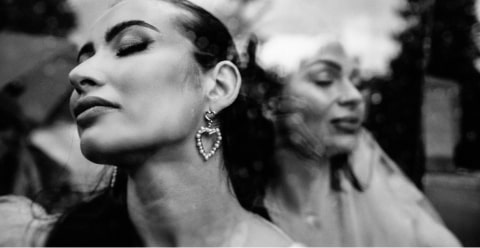If I could go back and tell my younger self anything, it would be to get on board with the advances of tech.
I’m going to tell you a personal story.
It was the year 2003, Beyonce’s Crazy in Love was being smashed on the radio, Apple had just launched iTunes and Australian UGG boots were being worn everywhere. I was 24, halfway through my Photomedia degree and I was getting ready for my backpacking adventure through South America. I was contemplating how many rolls of film I would need for my 9-month adventure when my friend, who was also coming on the trip, burst into the room. She announced she had borrowed a digital camera and excitedly held it up to me the same way Mufasa iconically held up Simba for the first time.
A digital camera? Instead of film? I recoiled and gasped at the same time. I shook my head in disgust muttering something about “sacrilege”.
At that moment, I arrogantly decided that film was the “only option” for me. I was going to remain “authentic” and “real”, packing my trusty Canon EOS 5 SLR with 12 rolls of film feeling all sorts of pride, safe in the knowledge that I was a “purist.” By being loyal to film photography, I was “sticking it to the man” (the man, in this case, being advancements in tech and of course the introduction of digital photography cameras.)

How wrong I was.
If I could go back to that time again, I would have listened. I would have stayed open, and curious about the opportunity being presented to me. Instead of digging my heels in and puffing out my chest, I could have jumped on board the digital train and taken thousands of incredible photos on my journey through South America. In reality, my art was constricted as I was confined to shoot with a curated intention on every single frame because, as we all remember, rolls of film were expensive AF (back then and still to this day.)
Fast forward to 2025 and every Facebook group you’re in you’ll come across talk and lengthy debate about the introduction of artificial intelligence (AI). There is no doubt that the presence of AI and its disruption to the field of photography is profound. On top of all the rapid developments, we’re also forced to navigate the undercurrent of so many differing opinions when it comes to advancements in AI, and how it relates to our photography businesses. The division is simply palpable.
Our industry is changing and it’s changing fast.
In this article, I’m going to delve into the impact of AI as it relates to photography, exploring its benefits, potential drawbacks, and the importance of preserving the art’s inherent human touch and artistic soul.
Benefits of AI in Photography
Workflow Efficiency
In recent years, AI-powered tools and algorithms have offered photographers unprecedented ways to streamline their business and post-production workflows. This significantly speeds up post-processing tasks, being able to cull and edit hundreds of photos within minutes and creating artwork that a few years ago could only be imagined in our wildest dreams. This saves precious time for us photographers to focus on our creative vision and sit, albeit well-rested, in our zone of genius (or so we can binge-watch another episode of our favorite show on Netflix.)
Enhanced Image Quality
AI algorithms can enhance images by adjusting exposure, color correction, and noise reduction, helping us create our desired artistic vision more efficiently. The new features of automated AI photo culling, straightening, cropping, and subject masks are becoming more effective by the day. There is an almost instant gratification of having a Lightroom gallery culled and edited within minutes by Imagen, while I can sneak off to indulge myself with a hot coffee and stuff my face with a cupcake. It is a privilege I’m not sure I can live without.
Accessibility and Inclusivity
One of my personal values is inclusivity and AI has made photography more accessible to a wider audience. Automatic features and intuitive interfaces now enable individuals with little to no photography experience to create and capture impressive images. It’s interesting to consider the myriad of new opportunities and enhanced accessibility that AI brings to the table.
AI-driven tools have the potential to assist photographers with disabilities, allowing them to express their creative perspectives without limitations. Being a non-disabled person, I don’t often reflect on the challenges that others have to face in their daily lives. How incredible that AI can empower individuals who may not have the physical ability to hold, say an art brush, but are now able to utilize voice commands and accessibility tools to guide AI in the creation of stunning artwork that would otherwise be beyond their reach.

Concerns and Challenges
Although the integration of AI in photography offers numerous advantages, it also raises valid concerns regarding its potential consequences.
Loss of Authenticity
Some creatives argue that the automated and algorithmic nature of AI may result in a loss of the unique human perspective and emotional connection that we bring to our work. That is what makes us human; our depth of soul, our personality, and creative intuition that is present in photography’s soul could be overshadowed by algorithmic decisions.
Standardisation and Homogeneity
AI algorithms have the potential to promote a specific aesthetic or style, which could result in a standardization and impotency of visual content. Would there be a reduction in the diversity and individuality of photographic expressions as AI favors what’s trending and has predetermined parameters? Will our content all become one conveyor belt line of sterile I,Robot photographs showing up and sanitizing our Instagram feeds?
Ethical Considerations
This is a big one. The use of AI in photography raises ethical questions regarding the authenticity and credibility of images. With the advancement of deepfake technology, there is an increased risk of manipulated or counterfeit visuals, blurring the line between reality and fiction.
Preserving the Soul of Photography

I’ve seen professional photographers creating the most amazing photographic art with AI and I’ve witnessed the blatant bullying they are receiving online. I’m not opposed to someone having a difference in opinion, in fact I personally welcome the thought-provoking discussion that can come from it. We learn and grow from telling our stories, from sharing ideas and from being around others whose experiences teach us something outside of what we know.
The lens in which we view the world shapes our behavior, our values and the way we live our lives. I love my lens and the way I see the world but sometimes it’s a little dusty, a tad out of focus, and I know it’s time for a good clean and calibration.
As a photographer who prides myself on running a heart-led business and shooting with soul, I’ve had moments where I contemplate whether AI will jeopardize the core essence of photography and permanently alter the trajectory of our industry.
I remember what my mum used to say about food. Everything in moderation.
I think that this landscape is changing rapidly and a balance between embracing AI’s potential and preserving the soul of photography is essential at this time.
Embrace AI as a Tool, Not a Replacement
Rather than relying solely on AI, we can view it as a powerful tool to amplify creativity. By combining AI’s capabilities with our unique vision, we can create images that reflect your own personal style and perspective.
Cultivate Technical and Artistic Skills
While AI can assist in certain aspects of the photographic process, honing technical skills and nurturing artistic sensibilities remain essential. The ability to compose, tell stories, capture emotions, and evoke a response in viewers are inherent to photography’s soul and can’t be replaced by algorithms.
Maintain Authenticity and Individuality
Can you resist the temptation to conform to AI-driven trends and strive to maintain your authenticity? Exploring new techniques, experimenting with different muses, and challenging yourself creatively can help you develop a distinctive voice that sets you apart. Knowing who you are and what you bring to the world is something no algorithm can rinse and repeat. When I am shooting, me and my muse are in our own bubble of creativity where magic happens. Energy is everything. And our humanness is unparalleled.
Educate and Engage

Promoting awareness and discussions around the impact of AI in photography can help navigate its integration responsibly and ethically. Encouraging dialogue among other photographers, artists, creatives and technology experts can lead to the development of AI tools that align with the values and intentions of our photographic community.
As AI continues to advance, I have to say its integration into the world of photography is inevitable. While concerns about losing the soul of photography are valid, embracing AI as a powerful tool rather than a replacement can help preserve the essence of the art form.
By recognising the unique perspective and emotional connection that we bring to our work, and by nurturing our technical skills and artistic sensibilities, we can maintain our authenticity and individuality. Ultimately, it is through a thoughtful and conscious approach that the marriage of AI and photography can strike a balance, enabling us to push creative boundaries while preserving the soul that makes the art form truly timeless.
The unknown is always scary. Our brains are literally designed to run away from anything that is not normal. While I know there is a lot of fear around the advancements of AI as it pertains to the photography world, let’s refrain from going all Black Mirror, running around the internet screaming “the end is nigh,” and maybe embrace the tech in a way that feels good for you.
So do I embrace AI in photography? Absolutely. And I also believe that our humanness will not be erased unless we stop being human. In the words of Jonas Peterson when asked, “Why not stick to real photography then? Because this is where we are, this is a moment in time where everything is changing and I’m using a new tool to express myself. As a response to the norm. To make people feel. And to teach the machines something about being human”
–

Belle Verdiglione is your break-the-rules mindset and business coach, speaker, and founder of Camera Queens, a female and non-binary photography community.
You can listen to Belle chatting with rad humans on her Camera Queens podcast.
